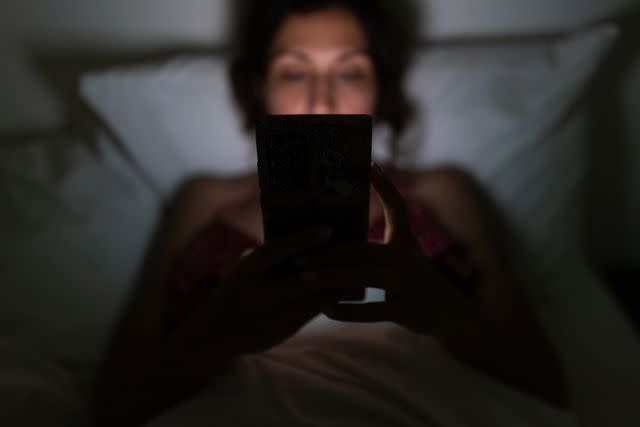Psychiatrist Dr. David Pruder on Everyday Habits That May Be Affecting Your Mental Health
The psychiatrist and mental health podcaster breaks down ways to break bad habits, from limiting your phone usage before going to bed to exercising

Getty
Generic image of cell phone usageDaily routines can help provide structure and certainty in a person’s life. But some of the little things we do every day – especially in an increasingly modern world – can negatively impact our mental health.
Dr. David Pruder, a licensed psychiatrist who hosts the “Psychiatry & Psychotherapy Podcast,” recently spoke with PEOPLE about some everyday habits that can lead to negative mental health and ways you can start training your brain to break those routines to avoid micro negativities throughout your day.
Here are four areas of focus where you can cut down on daily habits you might not realize are impacting your mental health.
Limiting Screen Time

Getty
Woman using her smart phone in bed before going to sleepPruder suggests one major change people can make in their daily lives is to limit their screen time.
“There have been a lot of studies that show more than two hours a day of screen time increases risk of depression, suicidal thoughts, all sorts of different poor mental health outcomes,” the psychiatrist says. “And part of that is: What are people not doing when they're on their screens? They're not interacting with real humans, they're not doing exercise.”
One specific time of day to focus on limiting your screen usage is late at night, Pruder says.
“Your brain capacity, your ability to focus, concentrate, move forward in life, all of that is going to be impacted by your sleep,” Pruder notes.
Not only does staring at a screen right before you go to bed – whether your phone, a television, or another device – impact how much melatonin your body is producing, but the psychiatrist says most peoples’ brains become more impulsive at night, allowing anxieties and fears to more easily dominate a person’s headspace. This can also disrupt your ability to fall asleep, and evidence shows that consistent sleep is key to good mental health.
The psychiatrist says it’s a good idea to begin dimming your lights and avoid using your phone about an hour before going to bed. Pruder suggests putting your phone in another room to avoid being woken up intermittently when a notification rings, or to reach for their phone when they wake up in the middle of the night.
“It's hard though,” Pruder admits. “I empathize with anyone who has a hard time doing it and wants to binge on Netflix or something. I've been there.”
Exercising

Getty
Generic image of a woman joggingRoutine strength training and cardio workouts can both positively impact different hormone systems and brain systems in complimentary ways, Pruder says.
Many people who stop routinely exercising develop anxiety and depression, the mental health professional points out.
“I see a lot of that with bikers when they stop,” Pruder says. “They stop [routinely biking and working out] and they just feel awful.”
This pattern also is evident with many college-aged students once they stop playing sports after high school. Pruder recommends getting together with friends to do outdoor activities, or looking into joining a local recreational sports team to stay active and on top of your physical health, which will ultimately impact your mental health as well.
“Being a part of a sports team is great for ADHD, depression, anxiety, pretty much every mental health condition,” Pruder says.
Paying Attention to Your Diet

Getty
Generic image of a woman eatingEating healthier is another major change people can make to their daily lives that will have a positive impact on their mental health, Pruder says.
Pruder recommends limiting processed foods and points to a 2017 study that shows how adopting a Mediterranean diet can lead to a reduction in depression for many people.
He also notes that studies about how bodies change over time as healthier eating habits are adopted show that there are measurable impacts on mental health as well.
“It's not like one thing has changed in your body,” the psychiatrist says. “It's like tens of thousands of changes happen just by making that one change. That’s where the magic happens.”
Connecting with Others

Getty
An image of a couple sitting by a window and communicating with each otherLastly, Pruder says focusing on our connection with others is another major category to work on every day – whether that’s seeking out positive relationships, or starting psychotherapy, which can help people better connect with others.
“A lot of people I meet who have significant mental health concerns have progressively become more detached from the world to the point that maybe they have one person they have some connection with. Some people have zero,” Pruder says. “And that's for many, many reasons, but as they progress out into the world, they always end up inevitably connected to more people.”
Pruder implores people to “invest in good friendships, value good friendships, and pursue good friendships” or consider therapy to help replenish and build social skills. “If psychotherapy is accomplished well, and you are more empathetic, generous, a better listener, a better friend, then you go on in life and it impacts thousands of future relationships,” he says.
Staying Motivated
It’s hard to make positive changes to your life once you’re settled into a routine.
“But focus on the meaning and the purpose,” Pruder recommends. “Think about ‘why’ you’re doing the things you’re doing. I think that’s essential. Then you can start to make decisions based on what you really value in your life.”
For more People news, make sure to sign up for our newsletter!
Read the original article on People.


